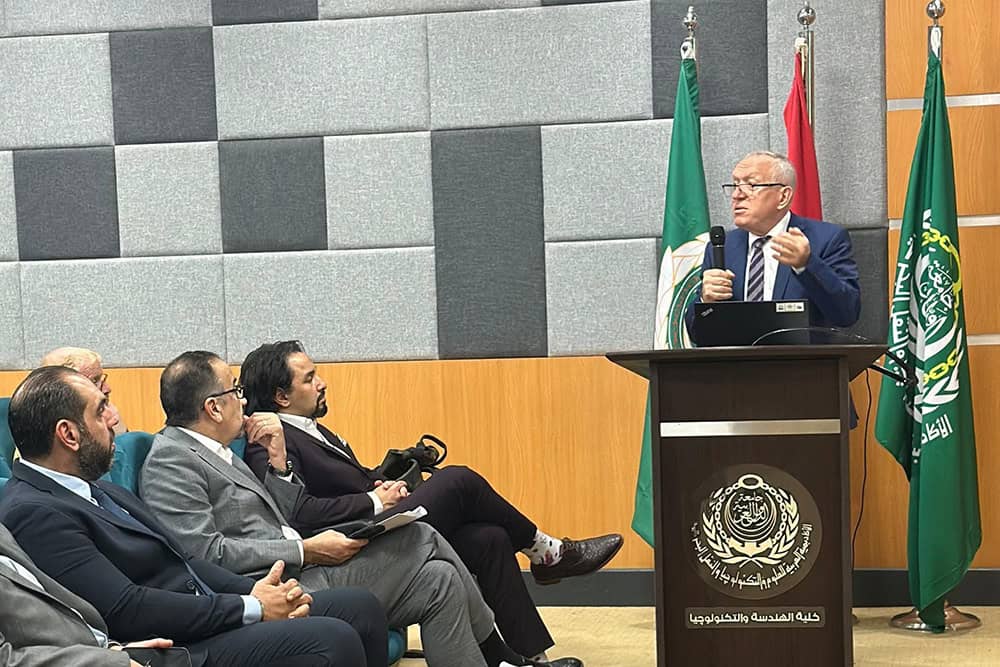Oshawa university takes lead in clean energy and nuclear power summit in Egypt
Published July 25, 2024 at 9:47 am

Sustainable energy solutions for Africa and the Middle East were the key talking points at an Ontario Tech-led Clean Energy Summit in Cairo, Egypt earlier this month.
The Oshawa university and its nuclear and clean energy partners came together in Cairo July 4 to talk about the importance of international collaboration on developing innovative and sustainable energy solutions and of the role small modular reactors (SMRs) can play in powering the region’s future.
Held in collaboration with the Arab Academy for Science, Technology & Maritime Transport and the Academy Company for Information, Communication Technology and Business Services, the event focused on the applications in the rapidly emerging realm of small modular reactors (SMRs), along with other clean-energy technologies.
The International Atomic Energy Agency (IAEA) also participated in the summit, along with representatives from South Africa’s North-West University and Egypt’s National Academy of Information Technology for Persons with Disabilities.
In addition to highlighting Ontario Tech’s role as an IAEA Collaborating Centre, the summit also explored international collaboration and innovation in driving the transition to clean energy, opportunities for energy localization and the growing demand for highly qualified staff in clean technology industries.
One of the key discussions, led by IAEA senior expert on SMRs and nuclear fusion Dr. Vladimir Artisiuk, examined SMR developments and potential applications in providing clean, reliable energy. Artisiuk focused on deploying SMRs in Africa and regions with limited access to large-scale power infrastructure, along with the integration of nuclear, renewable and conventional energy systems.
“The summit demonstrates growing interest in small modular reactors that might be a vital option for Middle East and Africa countries to resolve the issue of access to clean and affordable electricity,” said Artisiuk. “Capacity-building for nuclear power is not just a resource model but also an immensely powerful instrument in increasing the intellectual potential of African nations for their prosperity.”
(Ontario Power Generation is currently building four SMRs at the Darlington nuclear plant in Clarington, just east of the main Ontario Tech campus. The SMRs will be the first in the G7.)
Moderated by Dr. Rami El-Emam, Strategic Advisor to Ontario Tech’s Vice-President of Research and Innovation, a panel of other experts at the summit addressed how SMRs could create robust, multi-purpose energy solutions, exploring:
- The impact of advancements in simulations and virtual reality on training and education in the nuclear and energy sector.
- The existing reality, challenges, and opportunities for post-secondary education to secure a sustainable future aligned with global net-zero goals.
- Long-term investment challenges in nuclear projects and potential solutions.
“About 600 million people in Africa do not have access to affordable electricity, which is a significant challenge for the continent,” noted North-West University Vice-Chancellor Professor Bismark Tyobeka. “In the majority of African countries, power systems are state-owned. This brings an opportunity to initiate long-term energy projects, such as those involving nuclear power, with possibilities of localization in terms of construction and manufacturing. This event is valuable in addressing nuclear power accessibility gaps by bringing together key partners to discuss and develop actionable solutions.”
A significant portion of the summit focused on the needs for education and training in the nuclear and clean technology industry sectors in African nations and the Middle East and North Africa region.
Discussions also covered how technological innovations, such as artificial intelligence and data science, can advance clean technologies. Experts identified specific skills that educational programs should develop to equip students and young professionals for future challenges, including the potential of gamification and serious game development to enhance training and capacity-building.
“This summit highlights the power of global collaboration in advancing clean energy and sustainable development and addressing the need for high quality personnel to serve the nuclear industry,” said Ontario Tech Research and Innovation Vice-President Dr. Les Jacobs. “Ontario Tech is honoured to contribute its leadership as an IAEA Collaborating Centre, by facilitating such crucial discussions that advance innovation and capacity-building as we push forward to achieve our shared net-zero goals.”
With the challenges of capacity-building in the energy sector greater than ever, Ontario Tech Engineering and Applied Science Dean Dr. Hossam Kishawy believes collaboration is the key to sustainable energy futures in developing nations around the world.
“This summit showcases the value of academic collaboration in equipping the next generation with the skills and knowledge necessary to drive progress in Africa and the Arab world.”
INdurham's Editorial Standards and Policies




